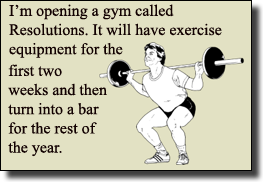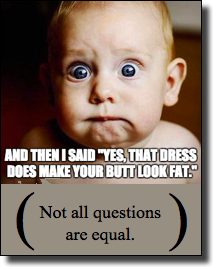 It was December 29th, 2009. I remember the moment well. For the first time in forever I had decided to cave in and make a New Year resolution. I haven’t made one since. Why should I? That one still stands as something I have yet to accomplish.
It was December 29th, 2009. I remember the moment well. For the first time in forever I had decided to cave in and make a New Year resolution. I haven’t made one since. Why should I? That one still stands as something I have yet to accomplish.
“Therefore, I hereby declare that in 2010 I resolve to ask more questions.”
It seemed like such a simple thing. I was really good at it when I was 5 – annoyingly so. Somewhere along the line to adulthood I decided that what I knew was more important than what I didn’t.There are many statistics that demonstrate the benefits of asking a lot of questions. It’s one of Stephen Covey’s critical seven habits that was rooted in the Prayer of St. Francis – “Seek first to understand, then to be understood.” Yet, despite all of this, I see so little evidence of this happening around me. In every day conversation, the declarative and imperative statements outnumber the interrogative ones one-hundred to one.
 The problem with my New Year resolution wasn’t my desire. Resolutions rarely lack desire. It was that I hadn’t given myself anything tangible to practice. It’s easy to walk into a meeting with the best intentions of asking more questions, but then somehow my ego takes over and I find myself needing to be understood.
The problem with my New Year resolution wasn’t my desire. Resolutions rarely lack desire. It was that I hadn’t given myself anything tangible to practice. It’s easy to walk into a meeting with the best intentions of asking more questions, but then somehow my ego takes over and I find myself needing to be understood.
So I decided to do something about it.
The challenge in asking questions is coming up with the questions. There is little time to think about what to ask when we are constantly talking. Likewise, when we are “listening,” we really aren’t – we are often thinking about what to say next. We have valued our part of the conversation over the person currently talking. If I was going to get better at asking questions, I needed to have a constant magazine of questions loaded and ready to fire. I needed practice and I needed a system.
To help develop that practice I’ve come up with a technique I call “3Q.” It’s very simple. At any given moment I must be able to come up with three questions on the spot that relate to my context. Much like comedy improvisation, they may not be good at first. That will come with practice. Speed of response was my main focus. The faster I come up with three questions, the more likely I was watching or listening with a questioning mind.
Just before sitting down to write this column I was overlooking a coconut palm tree and the beautiful ocean while sitting on the back deck of our vacation condo on Sanibel Island. Ding, a mental timer went off – 3Q! I need to rapidly come up with three questions.

- How long does it take for a coconut to ripen?
- Does car insurance cover it when a coconut lands on your car?
- How did the Professor make a radio transmitter out of a coconut?
Seriously, these are the ones I came up with. I need more practice.
In this case a mental timer went off to start this process. This isn’t a good way to trigger your 3Q process. You need a trigger that you don’t control. It needs to surprise you. Triggers can come from self-declared events, from an external device, or from others. I recommend starting with the first two while you get a little practice.
I have a free app on my phone called Random Timer. This app allows me to set a minimum and maximum interval for a vibration or sound to trigger. When the app triggers, I am obliged to come up with three questions relating to my current conversation or context. While I have not tried any of the iOS apps, there is one called Party Game Timer that appears to have equivalent features.
You can also use other natural triggers. You could trigger on every time you put your phone in your pocket. You could also create a modified version of the old “Hi, Bob” game, back when college, spare time, and Bob Newhart intersected nicely. Choose a trigger word. Then, whenever you hear that word you have to come up with three questions. I used the word “experience” at work. Amazing how many times a day  that comes up with a user experience team. If you want to get a lot of practice, try using the words “paradigm”, “leverage”, or “empower.”
that comes up with a user experience team. If you want to get a lot of practice, try using the words “paradigm”, “leverage”, or “empower.”
After you feel comfortable with the self-triggered process, enlist some friends to be your trigger. I had a co-worker at my last company that I asked to help trigger the 3Q at any time. It really gets fun when you can make it part of your team dynamic.
The aim of 3Q was to get myself into the habit of constantly seeing the world in an inquisitive way. Much like exercise, it’s hard at first, but the practice pays off in a short amount of time. Some of my greatest insights have come when I was frustrated trying to think of that third question. It’s at those moments that I have to dig down deep and think more about my context than I would have otherwise done. That’s the type of engagement that yields the best questions. I soon came to learn what I really didn’t understand.
Once you have strengthened your interrogatory muscle you’ll find that the way you interact with others will change. Those statistics referenced earlier will soon play to your favor instead of against you. Others will appreciate the new found interest you have in what they are talking about. You will start to look 20 years younger. (OK, maybe not that last one.)
Now, give me three questions.






